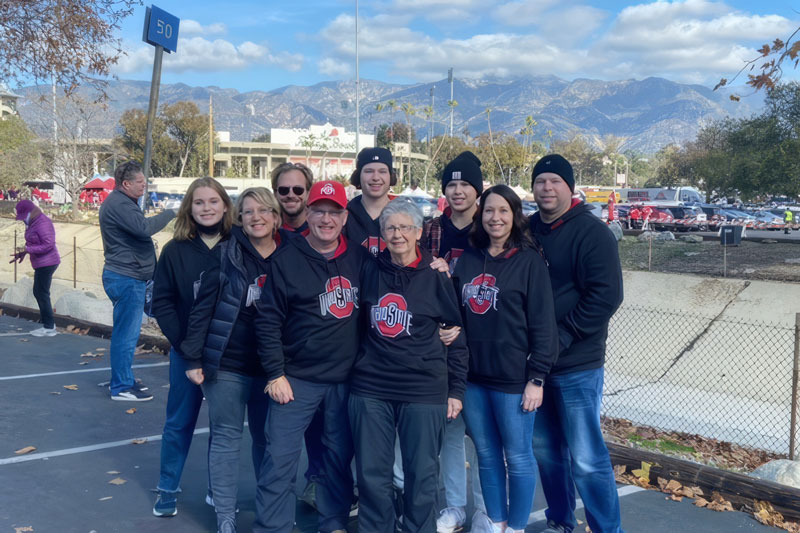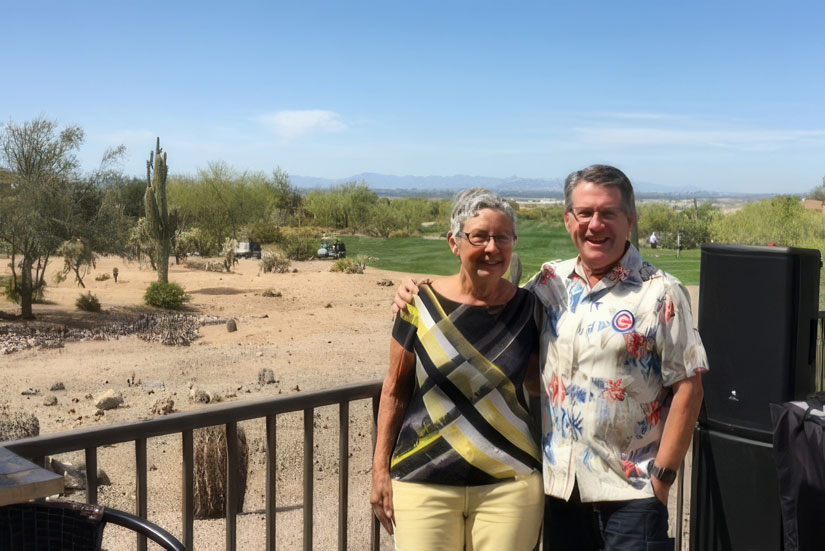
It's personal for donor Jim Berry
Retired Math Teacher Supports Dr. Ron Geyer’s Alzheimer’s Research
By Patricia Dawn Robertson“I’m still a person, aren’t I?” Joanne Berry asked her husband, Jim. “That statement just dropped me to my knees,” Berry confessed from the couple’s home in Sherwood Park, Alberta.
In 2016, Joanne Berry was formally diagnosed with Alzheimer’s disease. Jim, a retired math teacher, tackled the problem with vigour and curiosity. Joanne trained and practised for 23 years as a registered nurse (RN). Now it was Jim’s turn to be the caretaker.
“Joanne fights so hard every day just to do simple functions. That gives me the inspiration to fight for her. Because it’s not her; it’s the disease.”
Jim and Joanne, who were born and raised in Lloydminster, Sask., have been boyfriend and girlfriend since grade five. The couple, who married in 1972, have two daughters and three grandchildren.

When the retired couple spent the winters in Arizona, the Berrys loved watching the Seattle Mariners baseball team during their spring training.
Joanne was an avid golfer. Joanne’s golf friends reported back to Jim that Joanne struggled to keep track of her strokes since she could no longer keep score.
“I want her to keep playing with you. She needs to be outside,” was his pragmatic reply. Berry knew that exercise and fresh air would help. “Don’t worry, Jim, we’ll look after her,” said her loyal golfing pals.
During the couple’s time in Arizona, they belonged to the Moonlight Serenade Dance Club. “I dressed up in black tie. Joanne wore a ball gown. She just loved the dancing and the music,” says Berry. He says music still resonates with his wife. “It prompts an immediate mood change.”

Their Arizona retirement lifestyle is no longer possible so the couple makes the most of their time together in Sherwood Park where Joanne attends a day program four days a week.
“It’s been a lifeline. I don’t where I’d be without it,” says Berry. There are many excellent supports in place on what Jim calls Team Joanne: three doctors, a private dietician, a private nurse and a private pharmacist.
To ensure Joanne receives one-on-one attention, Berry even hires a private fitness instructor to accompany his wife to her day program. He says exercise provides much needed blood flow to the brain so it’s a crucial part of Joanne’s daily routine. “If you’re not moving, you’ll go down quick,” says Berry.
Missing from Team Joanne is someone who Berry says is “putting rubber on the road when it comes to finding a solution.” The disease’s widespread impact is evident since over 18,000 Saskatchewanians currently live with Alzheimer’s disease. Alzheimer’s makes up 60 percent of all dementias.
“I’ve been on a worldwide search for an answer,” Berry adds. “I’ve gone overseas. I’ve looked in the States. I’ve contacted Alzheimer’s Associations. My question: “Where are the clinical trials?’”
Berry discovered, much to his chagrin, that Alzheimer’s Associations don’t directly fund clinical trials. Their primary focus is caregiver support and education. “I have enough caregiver knowledge,” Berry says. “I’m looking for someone who has a solution, not a band-aid with more drugs.”
Jim Berry’s exhaustive search led him right back to his home province of Saskatchewan and Dr. Ron Geyer. “I wanted to donate directly to a possible solution. And to something that might be helpful for Joanne, if she was eligible. Or if not, for someone else in the future.”
“Joanne tries so hard,” says her husband. She’ll say to me: ‘What’s the matter with me? Can you help me?’” It comes as a relief to Jim Berry that some form of hope is on the horizon for Joanne and others who are living with the debilitating disease.
Dr. Ron Geyer says he’s yet to meet someone who doesn’t have someone connected to them with dementia. Dr. Geyer is employed as a professor in the Department of Pathology and Laboratory Medicine at the University of Saskatchewan.
Dr. Geyer’s speciality is the development of biologic therapeutics, like NeuroErythropoietin (NeuroEPO), which improves cognitive function better than any of the currently approved Alzheimer’s disease therapies.
NeuroEPO is a novel therapeutic drug. In human trials, it has yielded extremely promising results. NeuroEPO arrests cognitive decline in over 80 percent of trial participants. It improved cognition in approximately 50 percent of individuals with mild to moderate Alzheimer’s disease.
The biggest barrier to this cutting-edge research is sufficient funding. The cost of treating Alzheimer’s disease and related dementia in Saskatchewan is projected to rise to $6 billion by 2038.
“Saskatchewan is a great place to conduct these trials,” says Dr. Geyer. “We have the infrastructure, the medical expertise, the space and the equipment.” To finance phase two of NeuroEPO clinical trials, Dr. Geyer and his team need donor support.
“We’ve had a lot of interest in this study,” says Dr. Geyer. “Once the funding is secured, I don’t think it will take that long to complete the trial. I had hoped that we’d be going already but it’s taken longer to raise the money.”
Jim Berry, who closely follows the research, says the first trial results were phenomenal. “Why didn’t they get more financial support? Come on, people, let’s support Dr. Geyer’s research. If everyone affected by Alzheimer’s disease stepped up and even made a small donation, it could make a huge impact.”
If you are interested in supporting Dr. Geyer's Alzheimer's research, please visit our donation page.
